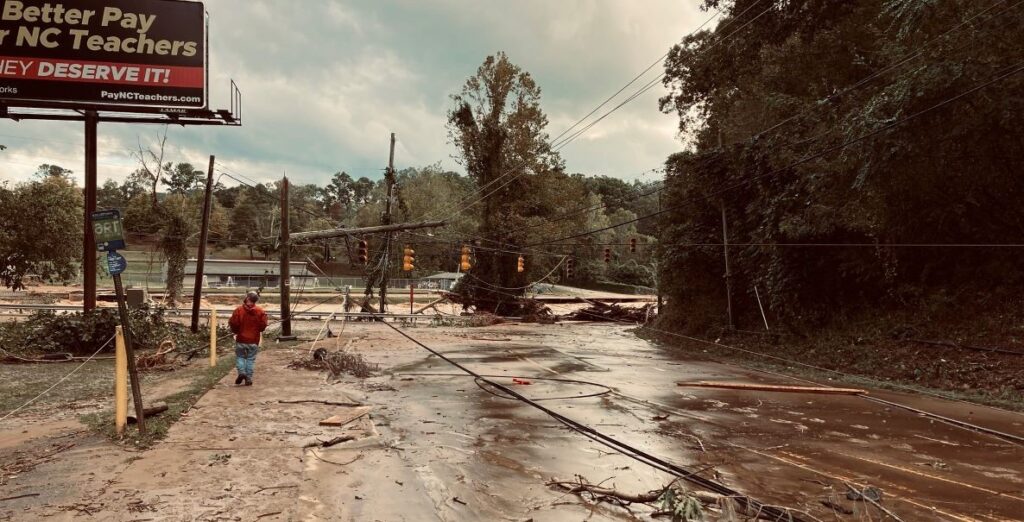Last weekend’s Hurricane Helene broke records, devastating North Carolina, as it moved into Appalachia, damaging homes and lives. At least 162 people have died, and many remain missing. More than 1.5 million people still don’t have power.
The damage is devastating, and people outside Helene’s ground zero are understandably worried about friends and loved ones who live in the state. Others are asking what they can do to help people recover from this terrible storm.
Some Philadelphians are already lending a hand. Saturday, a team of 45 first responders traveled with supplies and search and rescue dogs headed down to help with recovery efforts. North Carolina Governor Roy Cooper has been clear: Visitors are currently not welcome to the region, even to help. Right now, they need clear roads to get to the people who need the most help. But that doesn’t mean you should remain idle. Here’s how Philly can help people recover in the aftermath of Hurricane Helene.
1. Fund Hurricane Helene relief efforts
Donating money is the most efficient and effective way to get resources into the hands of people who are on the ground, doing the work. FEMA says “cash is best” in times of disaster. Both local nonprofits like Ashe Really Cares and Hearts with Hands, and national groups like the Red Cross are collecting monetary donations to help with relief efforts, amongst many, many others.
2. Donate blood

Hurricane Helene canceled more than 2,500 scheduled blood donations. Now, hospitals are facing shortages for people who were injured during the storm and may need transfusions. Organizations in North Carolina are holding blood drives for locals, but the Red Cross also regularly ships blood collected from other parts of the country to regions in need.
3. Donate food, pharmaceuticals and other supplies
In addition to monetary donations, food, water, medical supplies and other items are also needed. Ashe County Food Pantry is collecting and distributing food. Insulin For Life USA is collecting insulin. A number of breweries and restaurants in North Carolina are collecting water, baby items, non-perishable food items, wireless phone chargers, flashlights, batteries and other supplies.
4. Fly a plane, etc.

Samaritan’s Purse, BeLoved Asheville and Operation Airdrop are looking for on-the-ground volunteers to assist in managing and dispatching supplies, clearing trees, removing debris and other efforts. Operation Airdrop, in particular, is seeking licensed pilots with their own aircraft who can assist in transporting materials from one location to another. They can provide rooms for pilots who need an overnight stay.
5. Help the pets
The greatly impacted Asheville, NC Humane Society has rescued hundreds of animals during this crisis — and just sent 100 of them on a plane to safety. They say their greatest current need from afar is (no surprise) monetary donations. (For those closer by, they also need donations of gas.)
Only 130 miles away, flooding Charlotte, NC has a Humane Society that is offering 50 percent off adoptions in an effort to clear its shelters and make room for more rescued pets. They’re also looking for donations.
6. Offer insurance and legal assistance
A recent survey found that 56 percent of Americans are unaware their homeowners insurance policies don’t cover flood damage. After Hurricane Ian, a whistleblower alleged that insurance companies in Florida altered reports from adjusters so that they could pay homeowners less. A lot of people will need legal help after Helene, so they can receive the benefits their policies have promised them in order to rebuild their homes. Legal Aid of North Carolina, Implement Legal and others are offering pro bono legal services; you can volunteer your help, or donate to these causes.
7. Fight climate change
Up in the mountains and far from the coast, Asheville residents likely thought their homes were safe from the devastation of hurricanes. After all, realtors, the news and others actually recommended the city as a place people could go to flee the effects of climate change. We know global warming causes heavier rains during hurricanes and increases the frequency of natural disasters. Groups like the Sunrise Movement, Philly Thrive and the Clean Air Council advocate for policies that reduce carbon emissions and curb the effects of climate change. Support them.
8. Vote
Elected officials are critical when it comes to responding to disasters. The president can release federal disaster release funds, which can jumpstart recovery efforts. President Joe Biden approved half a dozen emergency funds requests for states affected by Helene. He’s said he may ask Congress to approve more funds. In 2019, then-President Donald Trump diverted money from FEMA to fund some of his border programs. Project 2025 calls for restructuring FEMA and limiting the support it can provide to states. Your vote will affect how the country responds to crises in the future.

